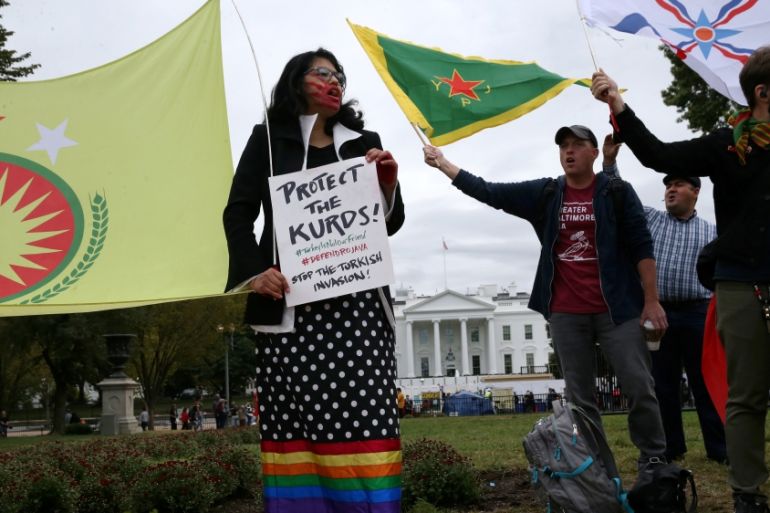US Treasury Secretary: ‘We can shut down the Turkish economy’
Steven Mnuchin threatens ‘very significant’ sanctions if Ankara targets civilians in campaign against Kurdish forces.

United States Treasury Secretary Steven Mnuchin said on Friday that US President Donald Trump had authorised the drafting of “very significant” new sanctions to target Turkey after it launched an offensive in northeast Syria.
Mnuchin said the US was not yet activating the sanctions at this time, but would do so if necessary and was already in the process of notifying banks.
Keep reading
list of 4 items‘We need you’: Solomon Islands’ support for US agency’s return revealed
Why are nations racing to buy weapons?
Parallel economy: How Russia is defying the West’s boycott
“We are putting financial institutions on notice that they should be careful and that there could be sanctions,” Mnuchin said. “These are very powerful sanctions. We hope we don’t have to use them, but we can shut down the Turkish economy if we need to.”
Mnuchin said Trump was concerned about Turkey’s potential targeting of civilians and wants to make clear that Turkey cannot “allow even a single ISIS fighter to escape”.
‘Not to commence this operation’
Meanwhile, the US Pentagon strongly denied on Friday accusations that it had abandoned its Syrian Kurdish allies to a Turkish military onslaught, which it said was destabilising the region and doing “dramatic harm” to US-Turkey relations.
Trump’s decision to pull back troops from Syria’s border with Turkey has been widely criticised in Washington as a tacit “green light” for a Turkish offensive that intensified on Friday, with Turkish air and artillery strikes on Kurdish fighters.
“Nobody greenlighted this operation by Turkey, just the opposite. We pushed back very hard at all levels for the Turks not to commence this operation,” US Defense Secretary Mark Esper told a news briefing.
Esper and US Army General Mark Milley, chairman of the Joint Chiefs of Staff, said they had spoken with their Turkish counterparts repeatedly in recent days, asking them to stop. But there was no sense that Turkey would do so, they said.
“I’m not seeing any indication or warnings of any planned stoppage of their military activity,” said Milley, the top US military officer.
Shortly after Milley spoke, Turkish President Recep Tayyip Erdogan warned he would not stop his assault against Kurdish fighters no matter what anyone said.
‘Secure those ISIS prisoners’
A war monitor said the death toll approached 100 from the first days of the assault, which began on Wednesday. Those killed included 17 civilians – as well as dozens of Kurdish fighters and Turkish-backed Syrian rebels.
The Kurdish People’s Protection Units (YPG) is the main fighting element of the Syrian Democratic Forces (SDF), which has acted as the principal allies of the US in a campaign that recaptured territory held by the ISIL group.
The SDF now holds most of the territory that once made up the ISIL group’s “caliphate” in Syria, and has been keeping thousands of ISIL fighters in jail and tens of thousands of their family members in camps.
Although he acknowledged the Turkish assault was having an impact, Milley suggested some Kurdish anti-ISIS operations had continued, without elaborating.
The US this week moved two high-profile ISIL prisoners being held by the Syrian forces out of Syria.
Milley said he had just spoken with the chief of the Turkish General Staff, General Yasar Guler, who he said “understands clearly” that the prisoners would be Ankara’s responsibility in the areas where it carries out the offensive.
“We, the US military, have no responsibility to … secure those ISIS prisoners in Syria,” Milley said.
The Pentagon also stressed the need for Turkey to avoid doing anything to endanger US forces inside Syria, which numbered about 1,000 prior to the incursion. Although US troops had no intention of firing on Turkey, its North Atlantic Treaty Organization ally, the Pentagon noted that US troops had the right to defend themselves, if needed.
Esper said he was repositioning additional troops around the region “to assist with force protection as necessary”. He also pushed back against criticism that the US troop pullback was a green light to Turkey, portraying it instead as a decision taken to protect his forces.
“This decision was made to ensure American troops were not caught up in the fighting between Turkish and Kurdish forces,” he said.